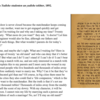1: Novel excerpt, Mordkhe Spektor’s "Yudishe studenten un yudishe tekhter," 1892.
Mordkhe Spektor (1858-1925) was an author, journalist, editor, and publisher who wrote dozens of Yiddish novels and stories and was especially known for establishing close contact with his readers by directly addressing them and through his journalistic tone. He was a central figure in the social and literary world of Yiddish writing in Warsaw and Odessa at the turn of the twentieth century and is considered an intermediary figure between popular and literary writing. His novel Yudishe studenten un yudishe tekhter (Jewish Students and Jewish Girls), published in 1892, is an early example of popular first-person diary literature in Yiddish about the experiences and feelings of courtship, a tradition that Karpilove takes up in her novel.
Although most of the episodes in this novel are written in the third person, several of the chapters are written as though they are excerpted from girls’ diaries. This resource is a translation of such an excerpt.
Suggested Activity: Read the passage and discuss with students: What is the impact of the first-person narration on the reader? Do you feel sympathy with the narrator’s position because it is coming directly from her? Does it matter to you that this woman’s perspective was penned by a male author, and how does knowing that impact your experience of reading this (if at all) in comparison to reading Karpilove’s diary novel?
What are the questions at stake for this narrator in considering whether to accept a marriage offer? How would you describe the social structures surrounding courtship and marriage for this narrator, and how are they different from those facing Karpilove’s narrator fifteen years later? What conclusions can students draw from this comparison about the shifting nature of relationships between men and women during this period?
Ask your students to write a diary entry from their own perspective about social and romantic relationships in their own lives. What are their aspirations? Observations? What do they observe about other people’s social lives, and the rules that seem to guide them? Make sure they know in advance that they will not be asked to share their writing with the class, so they can be as open as they want in the entry. Then, without revealing any specifics from their entry that they do not wish to share, ask them to compare the style of their writing, and the concerns or problems they discuss, to the Spektor excerpt or the Karpilove novel. What kinds of details do they—and do Spektor and Karpilove—choose to include? Is it more about narrative or about emotion? What are the roles of parents or friends in the entries? What could someone learn about contemporary social structures or cultural expectations about courtship by reading their entry?
Source: Mordecai Spektor, Yudishe studenten un yudishe tekhter (Berdychiv: M. Epshtayn, 1892), 51, https://ia800604.us.archive.org/18/items/nybc212436/nybc212436.pdf.

